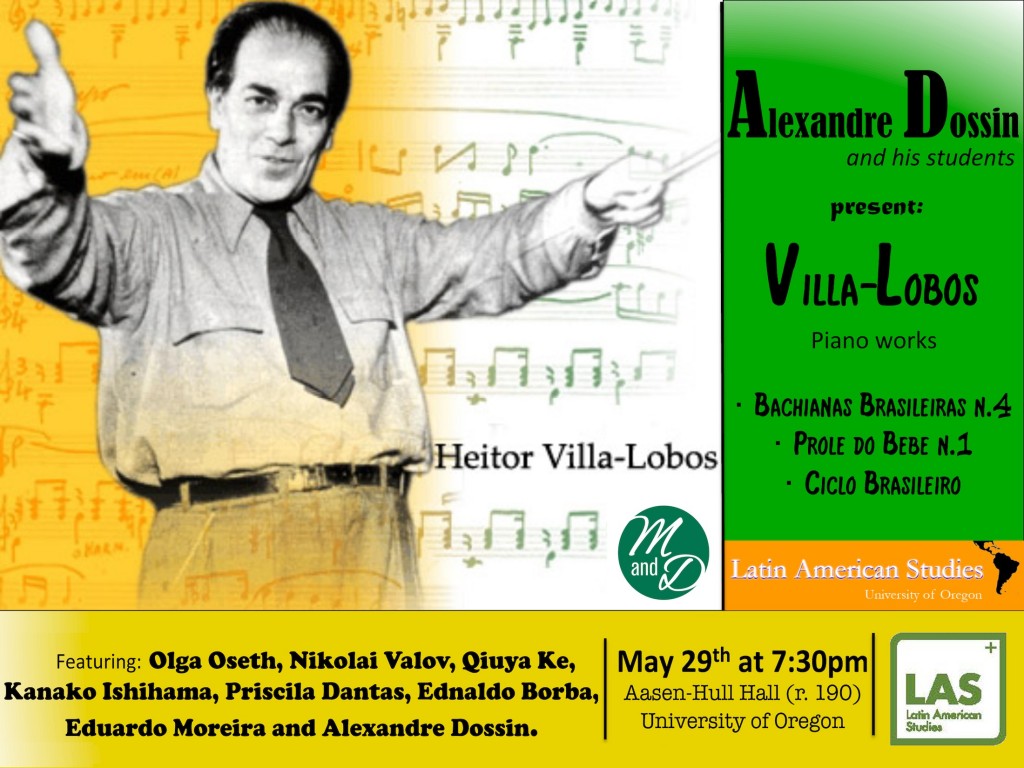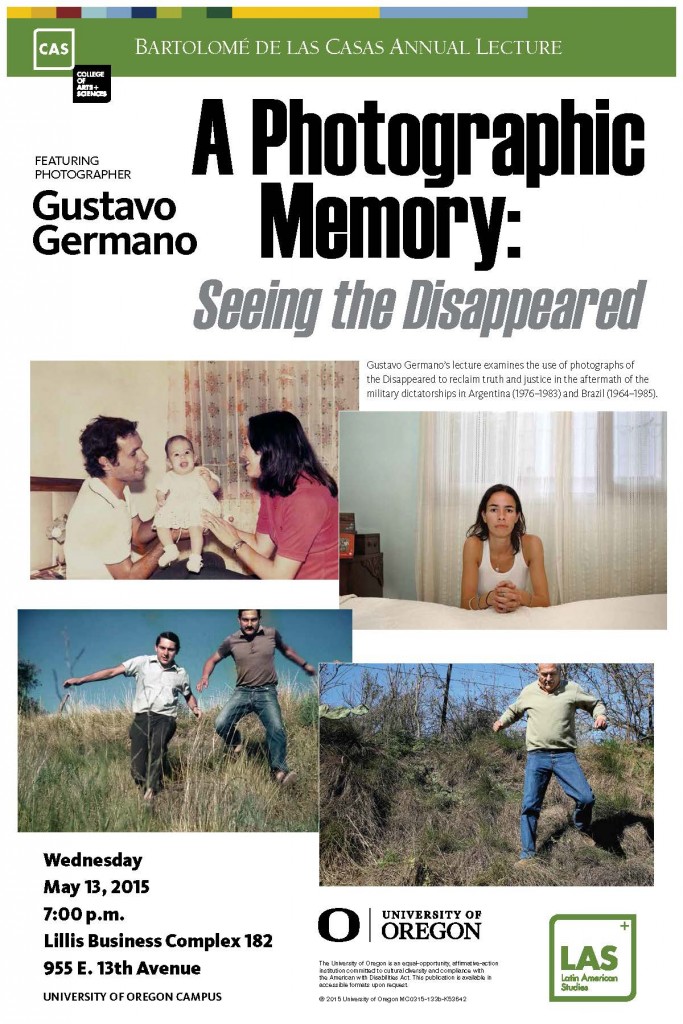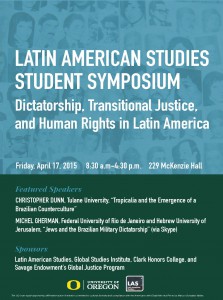Events
Trans-American Experience Conference Nov 5-7
This conference aims to explore the pluriversal spaces for thought that one finds in the Americas and the way these may be brought together in diverse crossings, encounters, and dialogues. Papers may range from the exploration of the various traditions of thought that compose Latin American, Caribbean, and North American philosophy and the way these interconnect, to engaging traditions and ways of thought not often recognized within the discipline of philosophy, such as indigenous thought, literature, music, the arts, and popular culture in transformative dialogue with philosophy. Accepted papers will be considered for publication in a special issue of The Inter-American Journal of Philosophy. Most meetings will take place in the Jacqua Center
For more information contact: Alejandro Vallega (Philosophy)
Trans-American Philosophy Conference.
November 5-7
39324 UO Philosophy 11×17
[embeddoc url=”https://las.uoregon.edu/files/2015/09/Trans-American-Experience-program-copy-r5ncj0.docx” download=”all” viewer=”microsoft”]
Roundtable on “The Future of Latin American Studies”
October 29th, Thursday. 1:00-2:30. Knight Library, Room 122. Guest speaker José Antonio Mazzotti will engage graduate students and faculty members in a conversation about the future of the field of Latin American Studies in U.S. research universities. Please join us for an open conversation. Coffee and cookies.
Public Lecture “Documenting the Iskonawa of the Amazon: Challenges to the Latin American Literary Canon”
Thursday, October 29th, 2015
3:30 p.m. Browsing Room, Knight Library.
Through interdisciplinary research and recent fieldwork, this talk will present an ongoing project that documents an endangered community: the Iskonawa of the Peruvian central Amazon forest. The Iskonawa oral tradition is full of knowledge about nature and survival strategies that speak volumes about the environment and the possibility of coexistence among humans and between humans and nature. However, like all indigenous societies in Latin America, the Isknonawa are threatened by deforestation, contamination, crime and drug trafficking. This case study also sheds light on canonic texts of the indigenista literary tradition and challenges some premises of postcolonial and decolonial theory.[embeddoc url=”https://las.uoregon.edu/files/2015/10/Poster-Mazzotti-UO-visit-2bd69jn.pdf” download=”all” viewer=”google”]
Study abroad program in Chiapas
A new study abroad program in Chiapas, Mexico is coming to the UO this summer. You can find out more at two events this week:
Another World is Possible: Service Learning and Intercultural Engagement Across Communities in Chiapas Tuesday October 13, 4:00 to 5:00 pm Friendly 214 Instituto de Lenguas Jovel Director Helga Loebell and Faculty Advisor Analisa Taylor give a sneak peek of the new UO Chiapas Program’s model of academic and public engagement through service learning, sharing with students and faculty how this program creates safe and socially responsible research and internship opportunities that benefit students as well as in-country organizations and communities. Refreshments provided.
Mayan Communities and Social Justice in Chiapas: Summer 2016 Program Open House for Students Wednesday October 14, 2:00 pm to 4:00 pm Volcanology 101 Join Program Director Helga Loebell and Faculty Advisor Analisa Taylor for an afternoon snack and virtual tour of the Chiapas Program that will take place in San Cristóbal de las Casas, Mexico July 17 to September 3, 2016. We’ll give you details on scholarships, courses, prerequisites, home stays, internship opportunities, planned adventures, and more. Refreshments provided.
Both events are free and open to the public. Sponsored by the Department of Romance Languages, the Office of International Affairs and the UO Global Justice Program.
Program Details:
This 7-week program offers you the opportunity to earn twelve upper division credits in Spanish through courses on Indigenous History and Culture in Chiapas, Mesoamerican Foodways, and Academic and Public Engagement across Communities. UO participants team up with Mexican youth to design and implement hands-on social, environmental, or cultural projects oriented toward your mutual interests. Excursions in and around San Cristóbal draw on the knowledge of local experts in fields such as Mayan History, Art, and Culture, Human Rights, Food Justice, and Environmental Education to create a holistic program of cultural and academic discovery.
With a population of approximately 200,000 people, San Cristóbal de las Casas is one of the oldest colonial cities in the Americas, and has been a center of Maya civilization for thousands of years before that. Highland Maya culture, crisp mountain air, and a cluster of internationally renowned universities, research institutes, and non-profit grassroots organizations make this quaint big city a magnet for curious idealists from all over the world and a cozy perch from which to explore the archaeological, natural, and cultural wonders of Southern Mexico and the Yucatán Peninsula.
Operating continuously since 1993, the Instituto de Lenguas Jovel is unmatched in Chiapas for its academic quality and reputation for social responsibility in working with community partners. The Instituto Jovel offers courses in Spanish, German, English, Tzotzil and Tzeltal, as well as cultural programming and workshops, making it a multicultural haven that echoes the provincial charm and international pulse of San Cristóbal. Instructors build museum tours and around-town exploration into their curricula, and Helga Loebell coordinates language exchanges, dance lessons, and cooking classes. Excellent yoga, dance, and martial arts studios are all within a few blocks of the school and students’ home stays.
See here 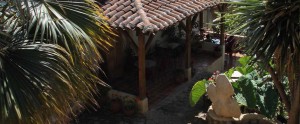 for a quick tour of the school and its setting in San Cristóbal. Please contact Professor Analisa Taylor at Analisa@uoregon.edu or Rick Batchelor at
for a quick tour of the school and its setting in San Cristóbal. Please contact Professor Analisa Taylor at Analisa@uoregon.edu or Rick Batchelor at
rbatche2@uoregon.edu for more information.
Program Dates: July 17-Sept 3, 2016
Application Deadline: March 1, 2016
Gustavo Germano’s Exhibit and Talk
The Latin American Studies Program had the honor of bringing to the University of Oregon acclaimed photographer Gustavo Germano’s exhibit Ausencias and the artist himself. The photographic exhibit is on view until August 18 at the Jordan Schnitzer Museum of Art. Family passes are available to the public–those interested please contact Monique Balbuena at balbuena@uoregon.edu
Gustavo Germano visited the campus in May. He met with students in the Clark Honors College, visited Prof. Terri Warpinski’s Advanced Photography class, met with several faculty, advised professors and curators on their Human Rights class, and gave LAS’ annual talk, the Bartolomé de las Casas Lecture.
A video of the lecture can be accessed here
A radio interview at the university radio is also available and will be posted soon.
Villa-Lobos Spring Concert
Friday, May 29
The Piano Music of Heitor Villa-Lobos
Featuring the Piano Studio of Alexandre Dossin
7:30 p.m., Aasen Hull Hall (Room 190), Frohnmayer Music Buiding
The piano students of Alexandre Dossin will perform works by the famed Brazilian composer, including “Ciclo Brasileiro” (Brazilian Cycle), a group of 4 pieces, “A Prole do Bebê no. 1” (Baby’s Family, vol. 1) and “Bachianas Brasileiras no. 4.”
LAS Spring Commencement
The Latin American Studies Spring Graduation Ceremony will be held at noon on Monday, June 15th, 2015. Our ceremony will be held indoors, in the Gerlinger Alumni Lounge.
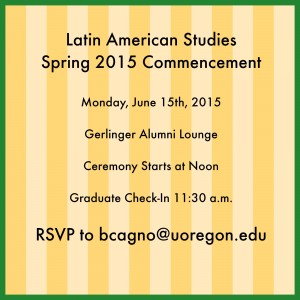
A reception with refreshments will follow, for graduates to enjoy with their guests.
Latin American Studies Major and Minor undergraduates who have applied for their degrees for Fall 2014, Winter, 2015 Spring 2015, and Summer 2015 are welcome to participate!
Please email bcagno@uoregon.edu to RSVP
Bartolomé de las Casas Annual Lecture–Gustavo Germano–“A Photographic Memory: Seeing the Disappeared”
Bartolomé de las Casas Annual Lecture
“A Photographic Memory: Seeing the Disappeared”
Wednesday, May 13, 7pm, 182 Lillis
Gustavo Germano will examine the use of photographs of the disappeared to reclaim truth and justice in the aftermath of the military dictatorships in Argentina (1976-1983) and Brazil (1964-1985). He will present the “antecedents” of the use of photography—both by the State organisms of control and the families of those kidnapped and murdered by the regime, who generally used the same photos emitted by the State in their campaign to find their family members. Germano will speak of his project, which seeks to give visibility to the disappeared. The Argentine photographer has personal connections to the issue, as his own brother was one of the disappeared, whose remains were found only last summer.
This lecture is co-sponsored by the Clark Honors College, the Office of Academic Affairs, the Global Studies Institute, the Department of Romance Languages and the Savage Endowment’s Global Justice Program.
**”Ausencias” at the JSMA**
In his work “Ausencias” (Absences), Germano restages snapshots of Brazilian and Argentine families whose loved ones are among the “disappeared”–people who were tortured and murdered by dictatorial regimes in South America from the 1960’s to 1980’s. The two images—the original photo and the recreated photo, with one or more people missing, are displayed together.
The Latin American Studies Program at the University of Oregon brought this work to the Jordan Schnitzer Museum, which embraced the project. The exhibit is currently on view, running from April 14 to August 16. More information about Gustavo Germano can be found at his site, http://www.gustavogermano.com. See also http://www.bbc.com/news/world-latin-america-21295117, http://www.puppiesandflowers.com/?p=4840 and https://jsma.uoregon.edu/Ausencias. The Latin American Studies Program would like to acknowledge the generous support of the “Oregon Humanities Center’s Endowment for Public Outreach in the Arts, Sciences, and Humanities” in securing the rights to present Gustavo Germano’s work at the UO.
LAS Student Symposium: Dictatorship, Transitional Justice, and Human Rights in Latin America
Latin American Studies Student Symposium
Dictatorship, Transitional Justice, and Human Rights in Latin America
LAS Student Symposium: April 17, 2015, McKenzie Hall 229
LAS Student Symposium Schedule
Featured speakers
- Christopher Dunn, Tulane University, “Tropicalia and the Emergence of a Brazilian Counterculture”
- Michel Gherman, Federal University of Rio de Janeiro and Hebrew University of Jerusalem, “Jews and the Brazilian Military Dictatorship”
Visiting guest speaker Prof. Christopher Dunn to discuss music of the Brazilian counterculture
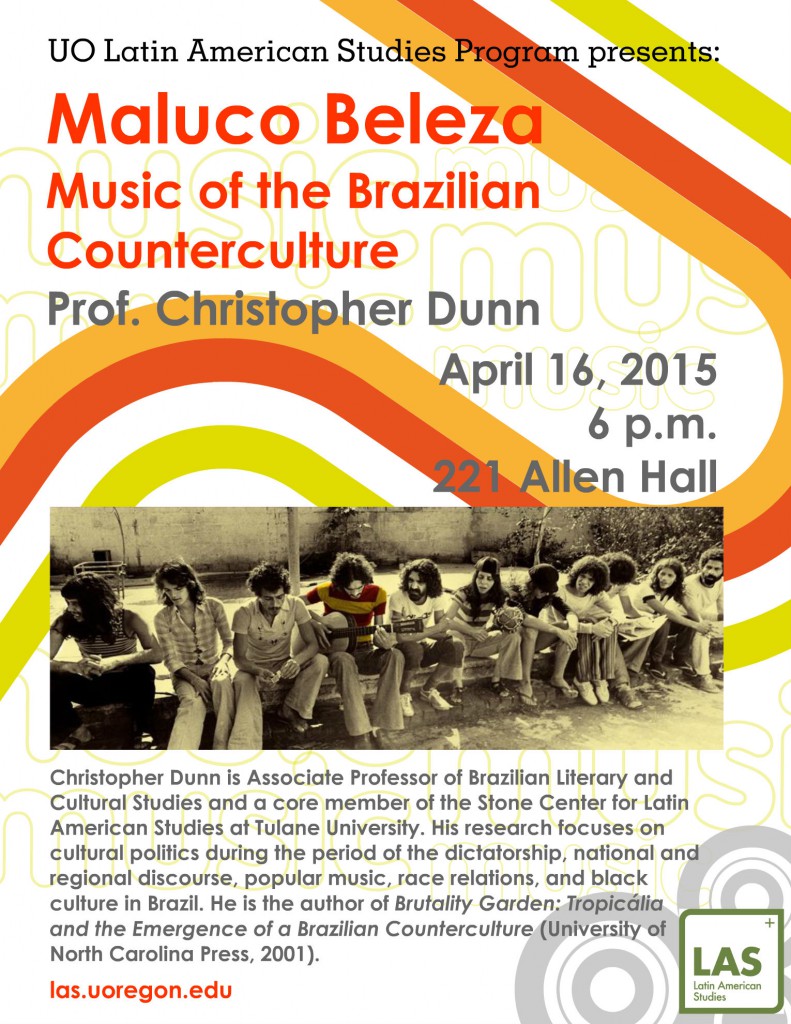
UO Latin American Studies program presents Guest Speaker Prof. Christopher Dunn, who will be giving a presentation titled “Maluco Beleza: Music of the Brazilian Counterculture”
UO Latin American Studies program presents Guest Speaker Prof. Christopher Dunn, who will be giving a presentation titled:
“Maluco Beleza
Music of the Brazilian Counterculture”
April 16th, 2015
6:00 p.m.
221 Allen Hall
This presentation will explore the popular music associated with the Brazilian counterculture of the early 1970s This presentation will explore the popular music associated with the Brazilian counterculture of the early 1970s during the most repressive phase of military rule. In the wake of the Tropicália movement of 1968, a broad range of artists, including Gal Costa, Jards Macalé, Luiz Melodia, Raul Seixas, and the Novos Baianos created music that spoke to the despair and desire of a generation of urban youth. As the revolutionary energies of the sixties subsided, artists explored notions of personal liberation associated with the so-called desbunde, a distinctly Brazilian experience with the international youth counterculture.
